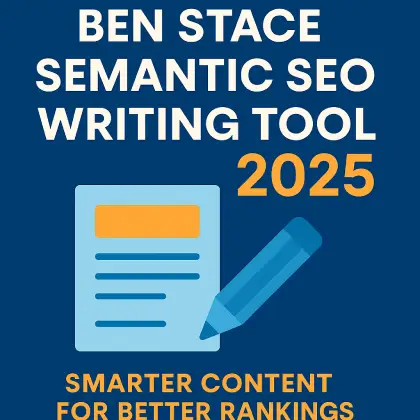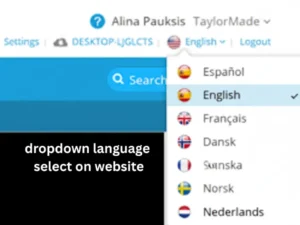Have you been searching for a way to write blog posts that Google actually loves?
The Ben Stace Semantic SEO Writing Tool might be exactly what you need.
In 2025, SEO isn’t just about keywords anymore it’s about meaning, intent, and how well your content answers a searcher’s real questions.
This powerful AI-driven tool, created by Semantic SEO expert Ben Stace, helps you create content that’s context-rich, reader-friendly, and designed to rank higher on Google.
IThis article breaks down what makes it different, how it works, and why it’s becoming a favorite tool for bloggers and small businesses
Why Semantic SEO Tools Matter for Rankings in 2025
In 2025, search engines are focusing heavily on contextual depth and topical authority rather than keyword stuffing. Tools like the Ben Stace Semantic SEO Writing Tool are designed to analyze search intent, entity relationships, and semantic variations that Google now prioritizes.
By using semantic clusters, the tool not only improves readability but also ensures your content aligns with Google’s Helpful Content Update and AI-driven ranking signals. This makes it an essential choice for bloggers, agencies, and businesses who want long-term sustainable rankings.
Why Traditional SEO Writing Tools Fail in 2025?
Most SEO tools help you write based on keywords. You type in “best travel destinations,” and they throw 50 related terms at you to stuff into your post.
But guess what?
Google’s algorithm doesn’t just match words anymore. It matches meaning, intent, and semantic relationships.
That’s why tools built on old SEO principles (like only focusing on keyword density) often lead to over-optimized, robotic content.
Ben Stace’s tool flips the script.

What Is the Ben Stace Semantic SEO Writing Tool 2025?
Think of it as your personal AI content editor that doesn’t just care about keywords it cares about context.
Here’s what it does:
- It looks at the topic you want to write about (not just keywords).
- It analyzes search intent behind that topic.
- It scans the top ranking pages to understand what Google expects from high-quality content.
- It gives you suggestions that align with semantic SEO principles like which related concepts, entities, and topics should appear in your article.
And yes, it still checks things like word count and readability but in a much smarter way.
Real Example: How It Works in Action
Let’s say you’re writing a blog post titled:
“Easy Healthy Breakfast Ideas for Busy Moms”
A typical SEO tool might say:
Use keywords like “healthy,” “breakfast,” “recipe,” “nutrition,” and repeat them often.
The Ben Stace tool, however, goes deeper. It might suggest:
“Mention terms like protein rich, meal prep, kids friendly, overnight oats, time saving, whole grains.”
“Talk about user needs like energy, convenience, picky eaters, working schedules.”
Why? Because it understands the real meaning behind the search not just what people type, but what they truly want.
That’s semantic SEO in action.

Key Features Of The Ben Stace Semantic SEO Writing Tool
Here are a few standout features you won’t usually find in average SEO writing tools:
✅ Real-Time Semantic Gap Detection
While writing, the tool checks your content against top pages and tells you what important concepts you’ve missed.
✅ Entity-Based Optimization
Instead of only keywords, it guides you to include relevant entities like brands, places, tools, and industry terms recognized by Google’s Knowledge Graph.
✅ Topic Coverage Score
Rather than chasing word count, you get a coverage score showing how well you’ve answered the topic comprehensively.
✅ NLP Model Alignment
This tool aligns with how Google’s Natural Language Processing (NLP) system works specifically updates like BERT and RankBrain. That means your content is easier for search engines to understand and rank higher.
👉 Learn more about how Google understands content using NLP
Ben Stace Tool vs Other SEO Writing Tools
Let’s compare quickly with some big names:
| Feature | Ben Stace Tool | Surfer SEO | NeuronWriter | Yoast |
| Focuses on Semantic Relevance | ✅ | ⚠️ Partial | ✅ | ❌ |
| Entity-Based Suggestions | ✅ | ❌ | ⚠️ Basic | ❌ |
| Content Score with NLP Mapping | ✅ | ❌ | ✅ | ❌ |
| Best For | Bloggers, Niche Sites | Agencies | Beginners | WordPress SEO |
Note: This tool is especially useful for bloggers, content marketers, and small business owners who want smarter content without paying big-agency prices.
Understanding Semantic Analysis in SEO?
Quick note for those wondering:
Semantic SEO analysis is the process of evaluating your content based on context, meaning, and topic depth, not just word count or keyword placement.
Ben Stace’s tool does this automatically helping your blog speak the same “language” Google does.

Results You Can Expect from Ben’s Stace SEO tool?
Let’s keep it realistic. This tool won’t get you page-one ranking overnight, but it gives you something better: authority and trust.
Here’s what you can expect:
- Improved indexing speed (because Google understands your content better)
- Longer time on page (because content matches reader intent)
- Better internal linking opportunities (as the tool reveals related topics)
- More chances to rank for related searches (due to semantic depth)
And remember, content that ranks for many semantically related terms is usually more future proof in Google’s algorithm.
Where to Get the Ben Stace Semantic SEO Writing Tool?
At the time of writing this article (July 2025), the Ben Stace Semantic SEO Writing Tool is available by invitation or private beta through select platforms.
You can request early access by signing up on relevant SEO forums or visiting his associated networks (we’ll update this as it becomes public).
Pricing info isn’t widely published yet, but it’s expected to follow a freemium model basic use free, with premium features unlocked via subscription.
Bonus Insight: Semantic SEO vs Holistic SEO
Many people get confused between the two. Let’s clear that up:
- Semantic SEO is about using language and meaning to connect content to user intent.
- Holistic SEO covers everything: content, site speed, mobile-friendliness, backlinks, technical health.
So, semantic SEO is just one (important) part of a bigger strategy.
Still, it’s becoming more critical as Google gets smarter.
Should You Try the Ben Stace Semantic SEO Writing Tool?
If you’re tired of keyword stuffed content that doesn’t rank, and you want a smarter, more human way to optimize your blog, the Ben Stace Semantic SEO Writing Tool is worth a try.
It’s not just another AI writer it’s a writing partner that understands how search works today.
Whether you run a niche site, write for clients, or manage a growing blog, this tool can help you stand out by focusing on what really matters: meaning, value, and clarity.
🔗 Want to know more about the creator of this tool?
Check out our previous article: Who is Semantic SEO Expert Ben Stace
Frequently Asked Questions (FAQ)
1. What is semantic SEO writing?
Semantic SEO writing means creating content that focuses on meaning, context, and user intent, not just keywords.
It helps Google better understand your topic and show your content to the right audience.
2. What is semantic analysis of SEO?
Semantic analysis in SEO involves using Natural Language Processing (NLP) to evaluate how well your content covers related ideas, entities, and context.
Tools like Ben Stace’s use this to improve topic coverage and content quality.
3. What is the difference between SEO and semantic SEO?
Traditional SEO focuses on keywords, backlinks, and on-page optimization. Semantic SEO adds a deeper layer.
It ensures your content is contextually rich, addresses search intent, and uses related terms and entities that Google understands.
4. What is the difference between semantic SEO and holistic SEO?
Semantic SEO is about writing smarter content with meaning and depth.
Holistic SEO is a broader strategy that includes technical SEO, UX, page speed, and mobile-friendliness in addition to content.
5.How does the Ben Stace Semantic SEO Writing Tool improve Google rankings in 2025?
The tool improves rankings by analyzing search intent, identifying semantic keywords, and building topic clusters that match Google’s AI-driven algorithms.
It helps content creators cover a subject comprehensively, boosting topical authority and visibility.
6. Is the Ben Stace Semantic SEO Writing Tool better than AI content generators?
Yes. Unlike generic AI writers, this tool is built specifically for SEO. It goes beyond generating text it structures your content around entities, semantic relationships, and user intent, making it more effective for ranking than traditional AI writing tools.
By Ambreen | ambreenbasit.online
Helping you rank smarter, not harder.












7 Responses
Good information about semantic seo writing tool
Highly recommended details